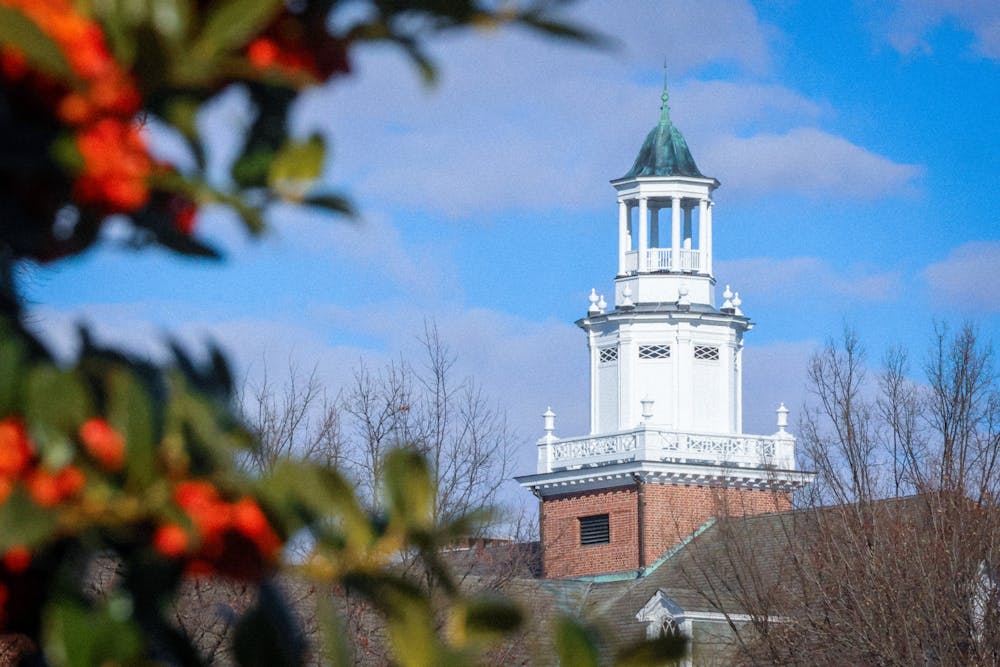Teachers and Researchers United (TRU-UE) — the Johns Hopkins Graduate Student Workers Union — held a rally on campus on Tuesday Jan. 28 to protest an alleged violation of worker’s rights as guaranteed by labor law and the collective bargaining agreement with the University.
In a statement on Instagram, TRU-UE stated that a graduate student worker who attended an event featuring speaker Mark Krikorian hosted by the Hopkins chapter of Young America’s Foundation, and interrupted by asking questions was facing disciplinary action by the Office of Student of Conduct. The organization alleges that the worker asked to have their Union representative present during the proceedings and was declined by the University, who allegedly stated that the worker was attending the event as a student and not as an employee of the University.
The right of employees to request Union representation in any meeting that could result in discipline or discharge is known as a Weingarten Right, and was established by the Supreme Court in 1975. The University’s bargaining agreement with TRU-UE, ratified in April of 2024, also states that unionized employees have this right.
In an email to The News-Letter, a University spokesperson declined to discuss the specifics of any particular student conduct proceeding but disputed the allegations raised by TRU-UE that workers are unable to have their union official present.
“All Hopkins students have the right to have a representative of their choosing present in student conduct proceedings and the University has taken the additional step of allowing PhDs represented by TRU-UE Local 197 to have a union official present as their chosen representative in the student conduct process,“ the spokesperson wrote.
The topic of whether graduate students, who often also work for the university as researchers or teaching assistants, ought to be recognized as university employees or students has been contested and the National Labor Relations Board (NLRB) has held differing positions over the years. In August of 2016, the NLRB ruled 3-1 that graduate student workers at private universities are employees and afforded the protections of the National Labor Relations Act, including the right of collective bargaining and unionization. The decision overturned the Board’s ruling in a 2004 case, in which it held that graduate assistants were not employees and had a “primarily educational, not economic, relationship” with the University.
"The Board has the statutory authority to treat student assistants as statutory employees, where they perform work, at the direction of the university, for which they are compensated,” the NLRB wrote in 2016. “Statutory coverage is permitted by virtue of an employment relationship; it is not foreclosed by the existence of some other, additional relationship."
In an interview with The News-Letter, graduate worker and TRU-UE steward Wisam Awadallah alleged that in some instance Hopkins graduate workers have been denied their rights to Union representation based on the University’s determination that they were acting in a student capacity. He argued that workers should only be recognized as students in explicitly academic settings.
“We are finding people called into meetings, often for pretty spurious reasons, and not afforded these rights because the University has made an artificial distinction between when we are students and when we are workers," he said. “Our stance is that our work is work unless we are doing something explicitly academic that is under the purview of our collective bargaining agreement, like sitting in a classroom or taking a test.”
The collective bargaining agreement between the University and the graduate workers union lists several “academic matters” that are not subject to bargaining and within the University’s discretion. The agreement additionally states that violations of academic policies that “arise outside the context of an employee’s employment” will be dealt with through University policies and procedures and thus excluded from the Union’s agreement.
In an email to The News-Letter, a University spokesperson stated that the attendance of on-campus speaker events typically does constitute an academic activity.
“On-campus speakers are at the core of the academic enterprise – but each case depends on the particular circumstances,“ the spokesperson wrote.
In an Instagram Post, TRU-UE alleges that they reached an agreement with the University for the collective bargaining rights to be applied to all cases where a worker faces disciplinary action, but that the University reneged on this agreement.
“We require that JHU recognize all workers have Weingarten rights, pursuant to labor law and terms we mutually agreed to in our CBA, in any meeting that may result in disciplinary action,“ the post stated.
A University spokesperson stated that the University has consistently followed the collective bargaining agreement, and that Weingarten rights and other provisions of the collective bargaining agreement only apply to actions taken by graduate workers within the context of their employment.
“Actions and conduct taken by PhD students outside of their professional capacity as an employee of the university are not subject to the terms of the union contract and are handled under established university policy and procedures,“ the spokesperson wrote.
The NLRB, the regulatory body which oversees labor disputes, is currently in flux. On Jan. 27, President Donald J. Trump fired the NLRB’s General Counsel Jennifer Abruzzo as well as Democratic board member Gwynne Wilcox, leaving the Board with only two members and unable to adjudicate any cases. The NLRB has often reversed itself over the years, and has done so on the issue of graduate worker status three times in the last quarter century (2000, 2004, 2016). Members of the Board are political appointees, highlighting the potential for changes in the Board’s composition and policies during the second Trump administration.





